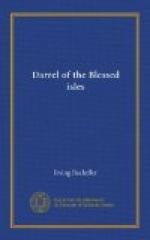“God only knows what is the next chapter,” said he, at last. “It may rob me of all that I love in this world.”
“But not of me,” said Polly, whispering in his ear.
“I wish I were sure of that,” he answered.
XXVI
The Coming of the Cars
That year was one of much reckoning there in the land of the hills. A year it was of historic change and popular excitement. To begin with, a certain rich man bought a heavy cannon, which had roared at the British on the frontier in 1812, and gave it to the town of Hillsborough. It was no sooner dumped on the edge of the little park than it became a target of criticism. The people were to be taxed for the expense of mounting it—“Taxed fer a thing we ain’t no more need of than a bear has need of a hair-brush,” said one citizen. Those Yankees came of men who helped to fling the tea into Boston harbour, and had some hereditary fear of taxes.
Hunters and trappers were much impressed by it. They felt it over, peering curiously into the muzzle, with one eye closed.
“Ye couldn’t kill nuthin’ with it,” said one of them.
“If I was to pick it up an’ hit ye over the head with it, I guess ye wouldn’t think so,” said another.
Familiarity bred contempt, and by and by they began to shoot at it from the tavern steps.
The gun lay rejected and much in the way until its buyer came to his own rescue and agreed to pay for the mounting. Then came another and more famous controversy as to which way they should “p’int” the gun. Some favoured one direction, some another, and at last, by way of compliment, they “p’inted” it squarely at the house of the giver on the farther side of the park. And it was loaded to the muzzle with envy and ingratitude.
The arrest of Sidney Trove, also, had filled the town with exciting rumours, and gossip of him seemed to travel on the four winds—much of it as unkind as it was unfounded.
Then came surveyors, and promoters of the railroad, and a plan of aiding it by bonding the towns it traversed. In the beginning horror and distrust were in many bosoms. If the devil and some of his angels had come, he might, indeed, for a time, have made more converts and less excitement.
“It’s a delusion an’ a snare,” said old Colonel Barclay in a speech. “Who wants t’ whiz through the air like a bullet? God never intended men to go slidin’ over the earth that way. It ain’t nat’ral ner it ain’t common sense. Some say it would bring more folks into this country. I say we can supply all the folks that’s nec’sary. I’ve got fourteen in my own family. S’pose ye lived on a tremendous sidehill that reached clear to New York City, so ye could git on a sled an’ scoot off like a streak o’ lightnin’. Do ye think ye’d be any happier? Do ye think ye’d chop any more wood er raise a bigger crop o’ potatoes? S’pose ye could




